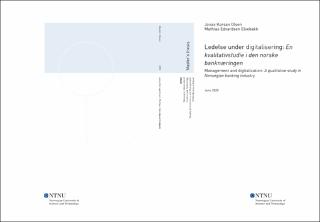| dc.contributor.advisor | Gustafsson, Ove | |
| dc.contributor.author | Olsen, Jonas Korsan | |
| dc.contributor.author | Elvebakk, Mathias Edvardsen | |
| dc.date.accessioned | 2021-09-14T17:16:00Z | |
| dc.date.available | 2021-09-14T17:16:00Z | |
| dc.date.issued | 2020 | |
| dc.identifier | no.ntnu:inspera:55685176:61182351 | |
| dc.identifier.uri | https://hdl.handle.net/11250/2777177 | |
| dc.description.abstract | Denne studien utforsker hvordan digitalisering i banknæringen har påvirket ledernes roller og krav. Studien er utarbeidet på bakgrunn av hvordan banknæringen fremstilles i mediebildet i dagens samfunnsutvikling hvor prosesser stadig automatiseres og digitaliseres. Hensikten med oppgaven er å analysere hvordan ledere i banknæringen håndterer denne situasjonen, preget av omstilling og utvikling. Basert på dette har vi undersøkt følgende problemstilling: “Er ledelsen i banknæringen godt nok rustet til å takle de utfordringer og muligheter som digitaliseringen medfører”.
Vi har besvart problemstillingen ved å undersøke oppgavens underliggende forskningsspørsmål, som er delt inn i tre tema. Temaene omhandler de mest sentrale områdene som utspilte seg fra nyhetsbildet og tidligere forskning innenfor problemstillingens rammeverk. De tre forskningsspørsmålene omhandler problematikken det digitale fokuset har ført til innenfor områdene Kompetanse, IT-virksomhet og ledelse. Vi har benyttet en kvalitativ case-studie med en abduktiv tilnærming. Datamaterialet til studiet er samlet inn gjennom arkivdata og 8 semi-strukturerte intervjuer med ledere i 4 ulike banker i Trondheim.
Funnene i studiet avdekket at ledelsen ser ut til å være klar over de største utfordringene og mulighetene knyttet til fokusområdene, men at det er vanskelig å konkludere med at de tar nødvendige tiltak for å håndtere disse hurtig nok. Vi fant et skille mellom de etablerte tradisjonelle bankene og digitale banker i håndteringen av problematikk knyttet til både kompetanse og IT-virksomhet, og det kan tyde på at ledere i tradisjonelle banker har den største jobben foran seg. Det kommer frem at de tradisjonelle bankenes utfordringer kommer som oftes av deres komplekse struktur. Disse bankene har som regel mange ledd i digital aktivitet og IT-virksomhet som gjør at veien til sluttproduktet blir lengre. Ledere i tradisjonelle banker ser ut til å være frustrert over bremsene byråkrati og gamle kjernesystemer medfører. Bankenes nye digitale fokus utfordrer kompetansen, innovasjonsevnen blant ledere og endringsviljen i IT-funksjoner. Lederne som blir hindret av manglende kompetanse, visjon, fokus, og av kompleksiteten i bankens organisasjonsstruktur står i derfor i stor fare for å bli utkonkurrert på sikt i et svært kompetitivt marked. | |
| dc.description.abstract | This study explores how digitalization in the banking industry has affected the roles and requirements of managers. The study was compiled on the basis of how the banking industry is portrayed in the media in today's social development where processes are automated and digitized. The purpose of the assignment is to analyze how managers in the banking industry handle this situation, characterized by restructuring and development. Based on this, we have investigated the following problem: "Are the management in the banking industry well equipped to meet the challenges and opportunities posed by digitalisation".
We have answered the problem by examining the thesis's underlying research questions, which are divided into three themes. The topics deal with the most central areas that emerged from the media and previous research within the framework of the problem statement. The three research questions address the problem that the digital focus has led to in the areas of competence, IT-operations and management. We have used a qualitative case study with an abductive approach. The material for the study was collected through archive data and 8 semi-structured interviews with managers in 4 different banks in Trondheim.
The findings of the study revealed that the management seems to be aware of the greatest challenges and opportunities associated with the focus areas, but that it is difficult to conclude that they are taking the necessary measures to deal with them quickly enough. We found a distinction between the established traditional banks and digital banks in the handling of issues related to both competence and IT-operations, and this may indicate that managers in traditional banks have their work cut out for them. It is clear that the challenges faced by traditional banks are often due to their complex structure. These banks usually have many links in digital activity and IT activities that makes the road to the end-product challenging. Managers of traditional banks appear to be frustrated by the bureaucracy and old core systems in their respective organisations. The banks' new digital focus challenges the competence, the ability to innovate among managers and the willingness to change in IT functions. The managers who are hindered by the lack of competence, vision, focus and the complexity of the bank's organizational structure are therefore at great risk of being out-competed in the long term in a very competitive market. | |
| dc.language | | |
| dc.publisher | NTNU | |
| dc.title | Ledelse under digitalisering: En
kvalitativstudie i den norske
banknæringen | |
| dc.type | Master thesis | |
